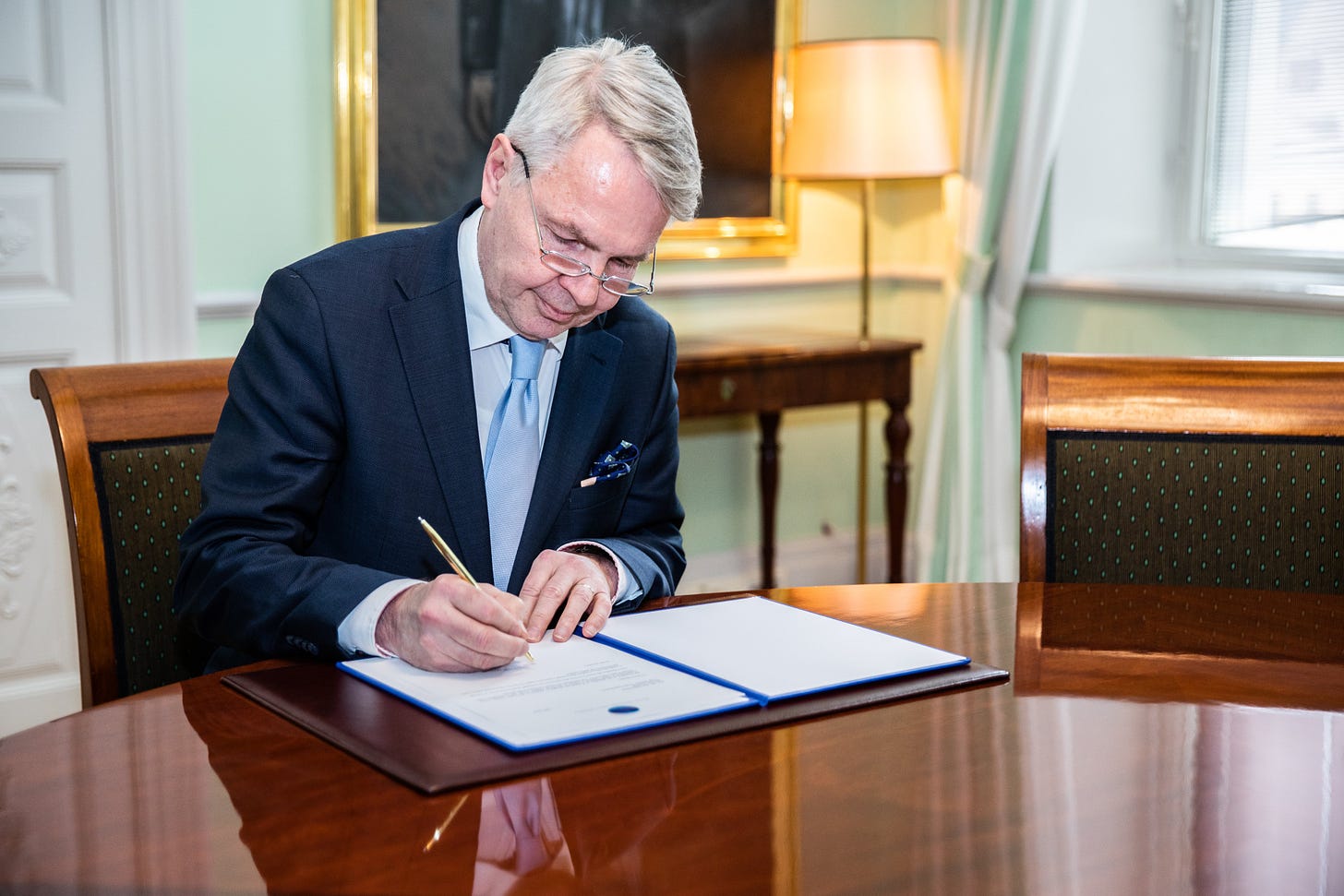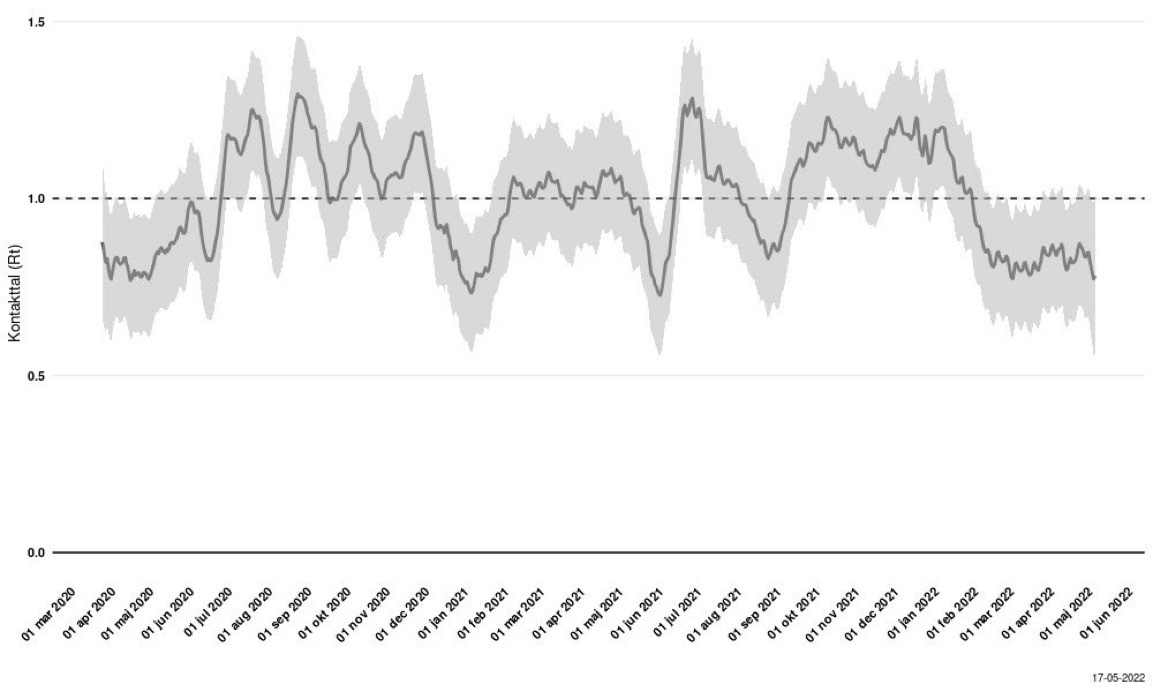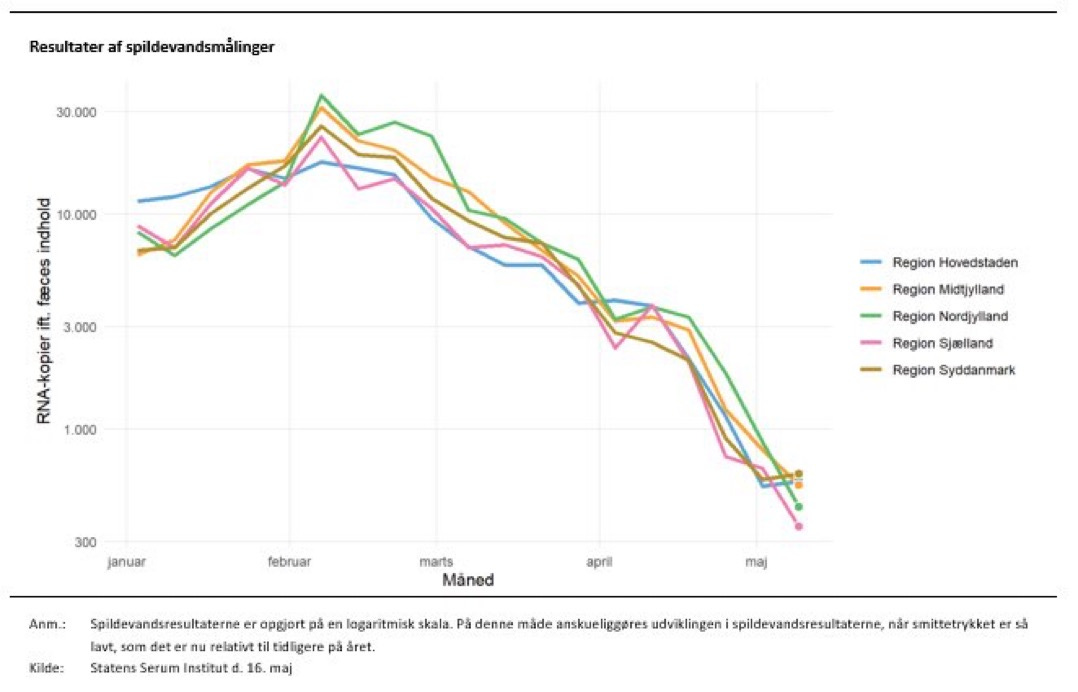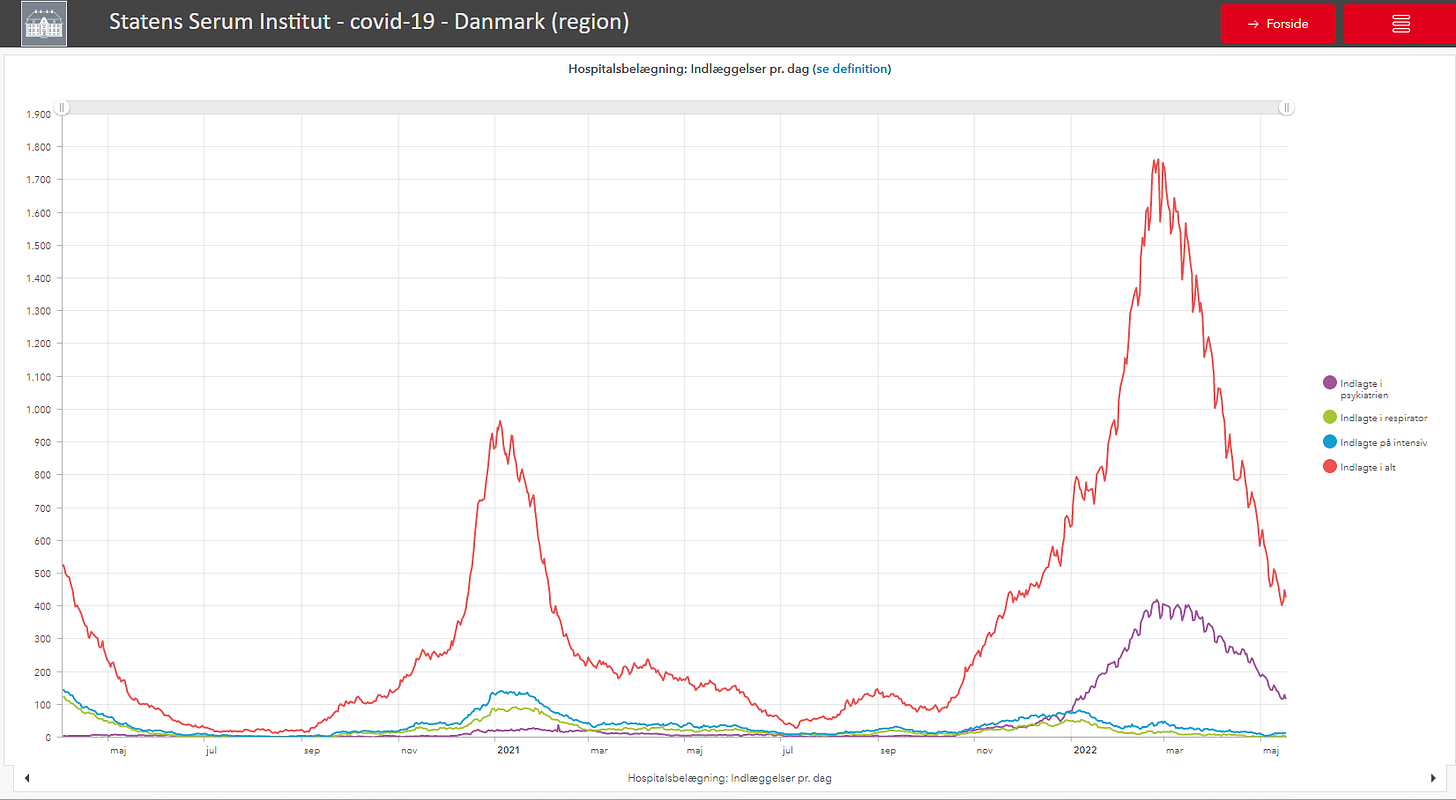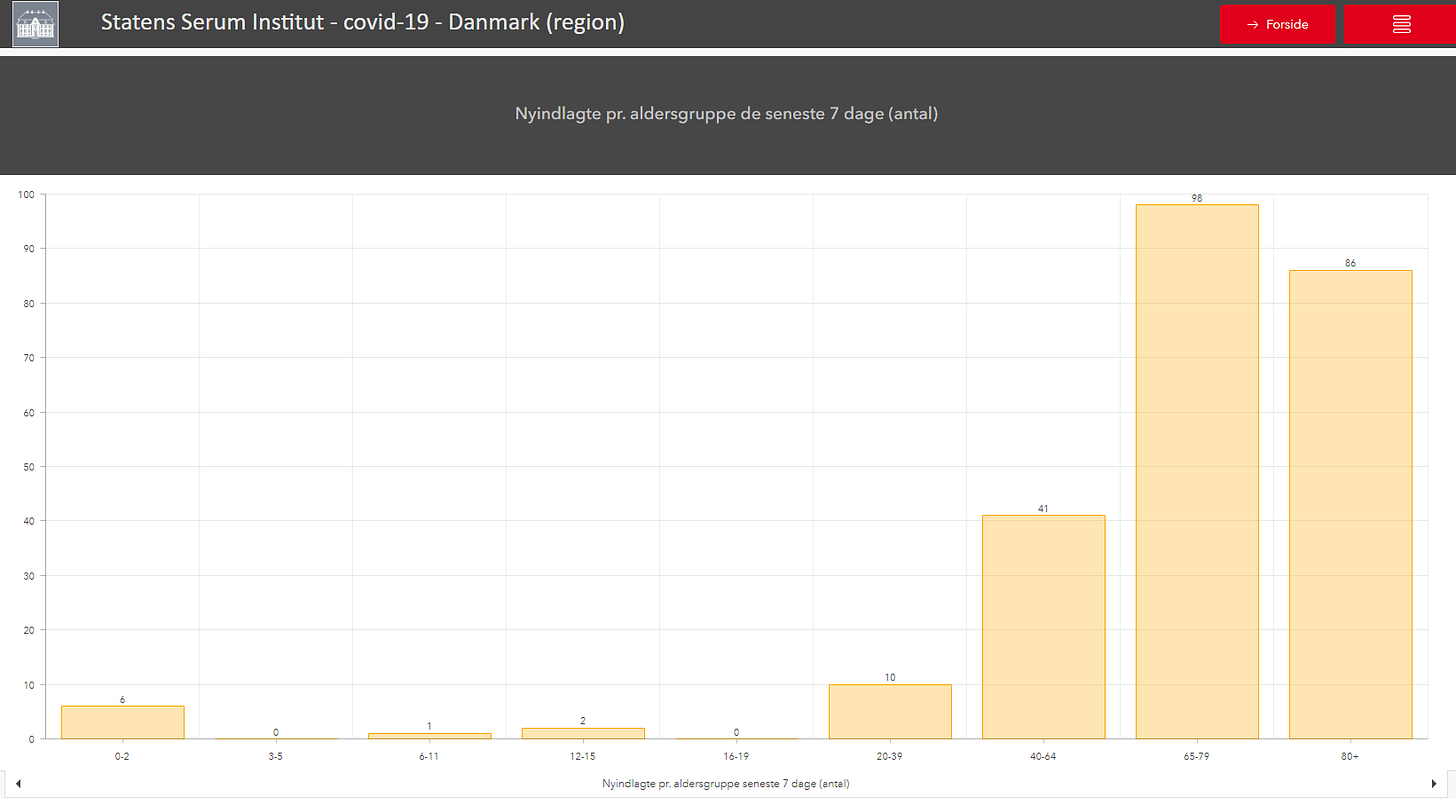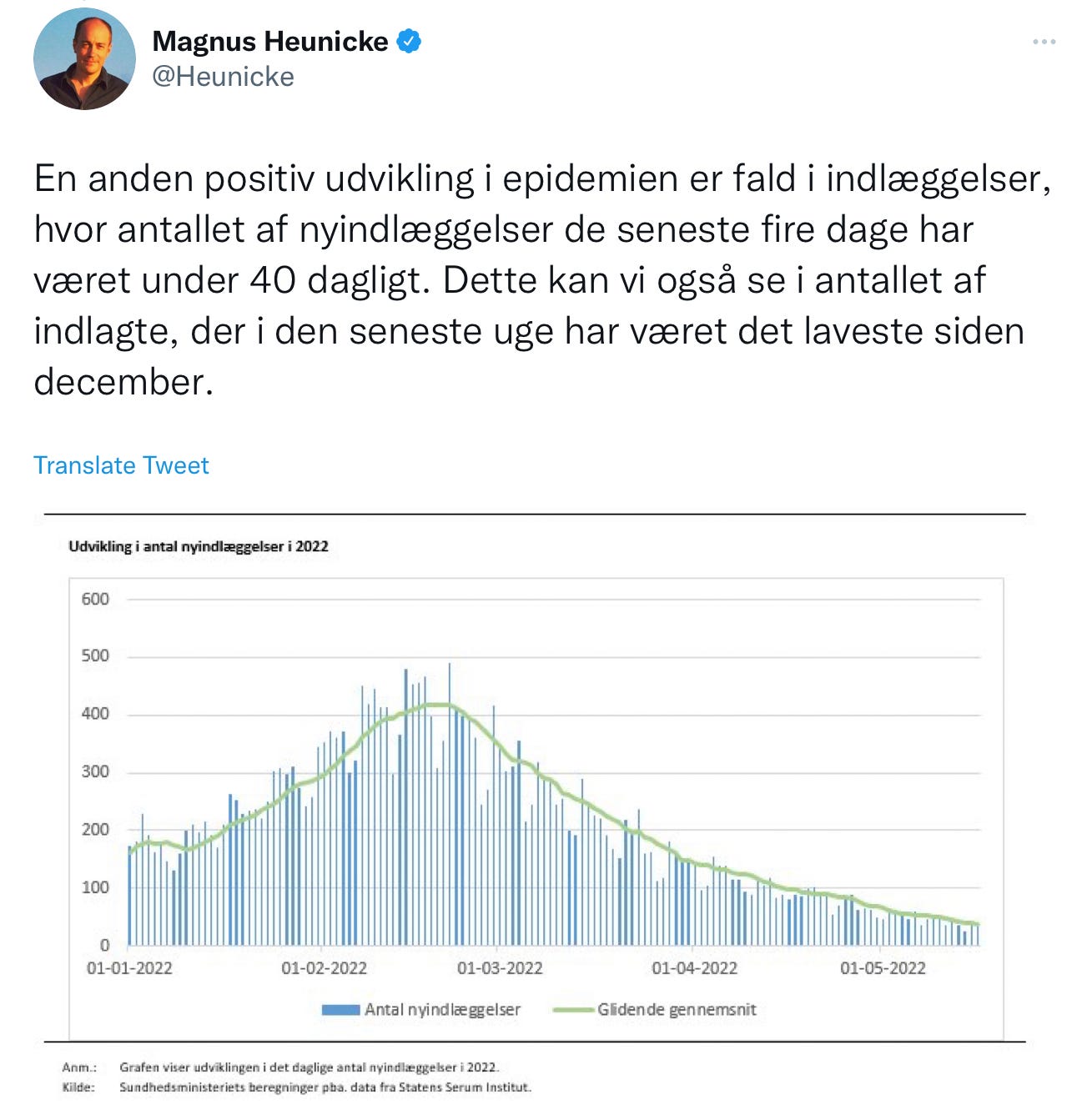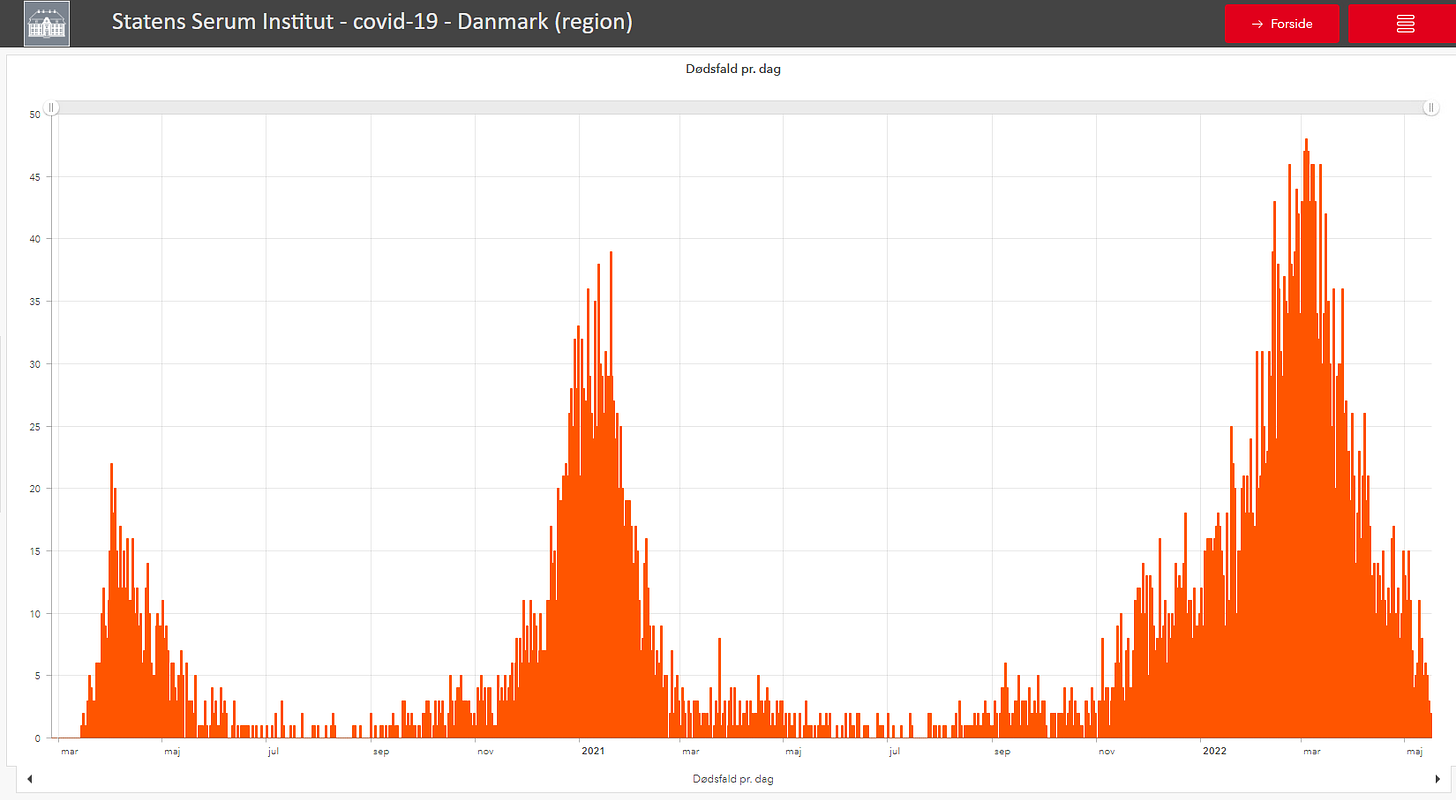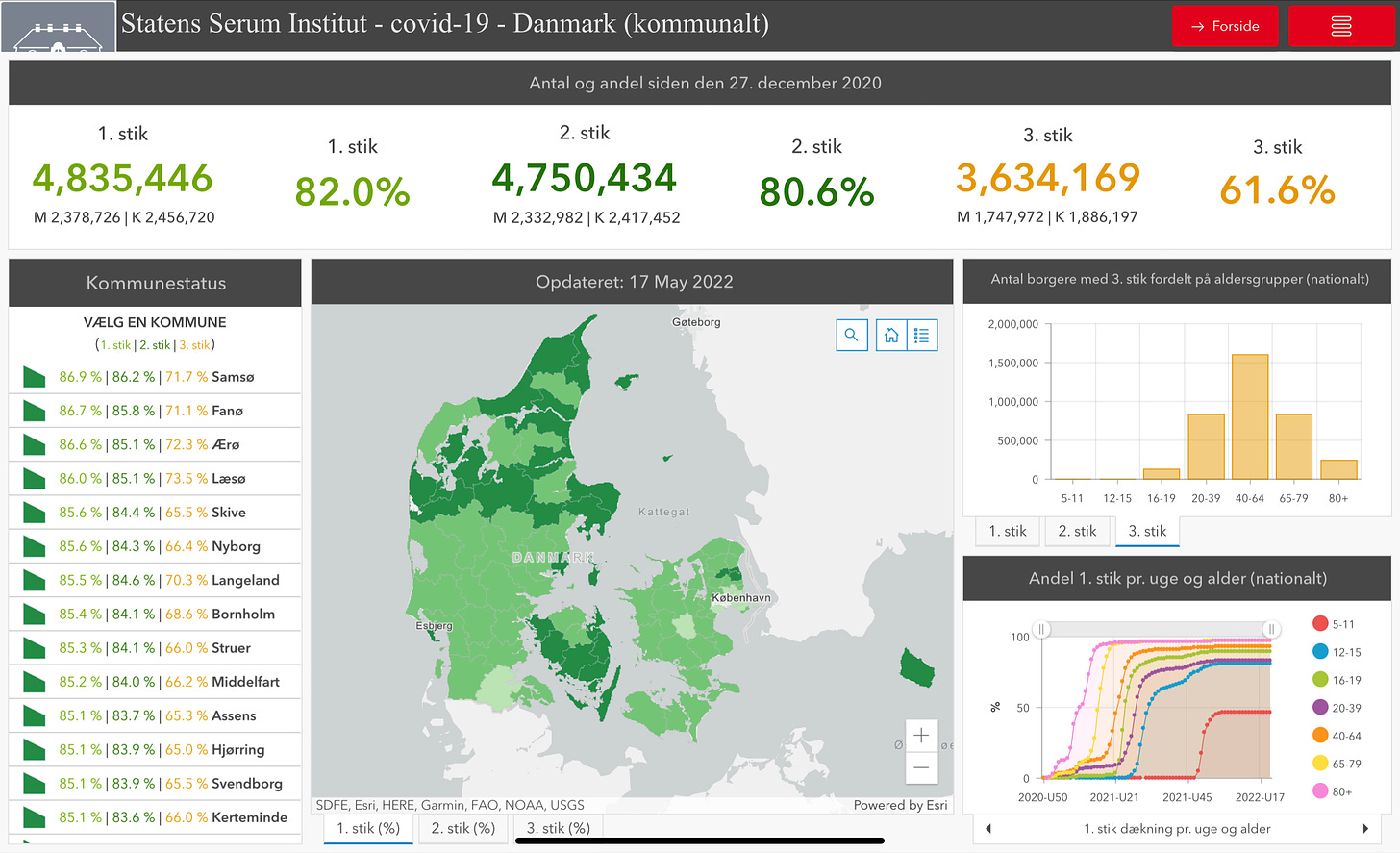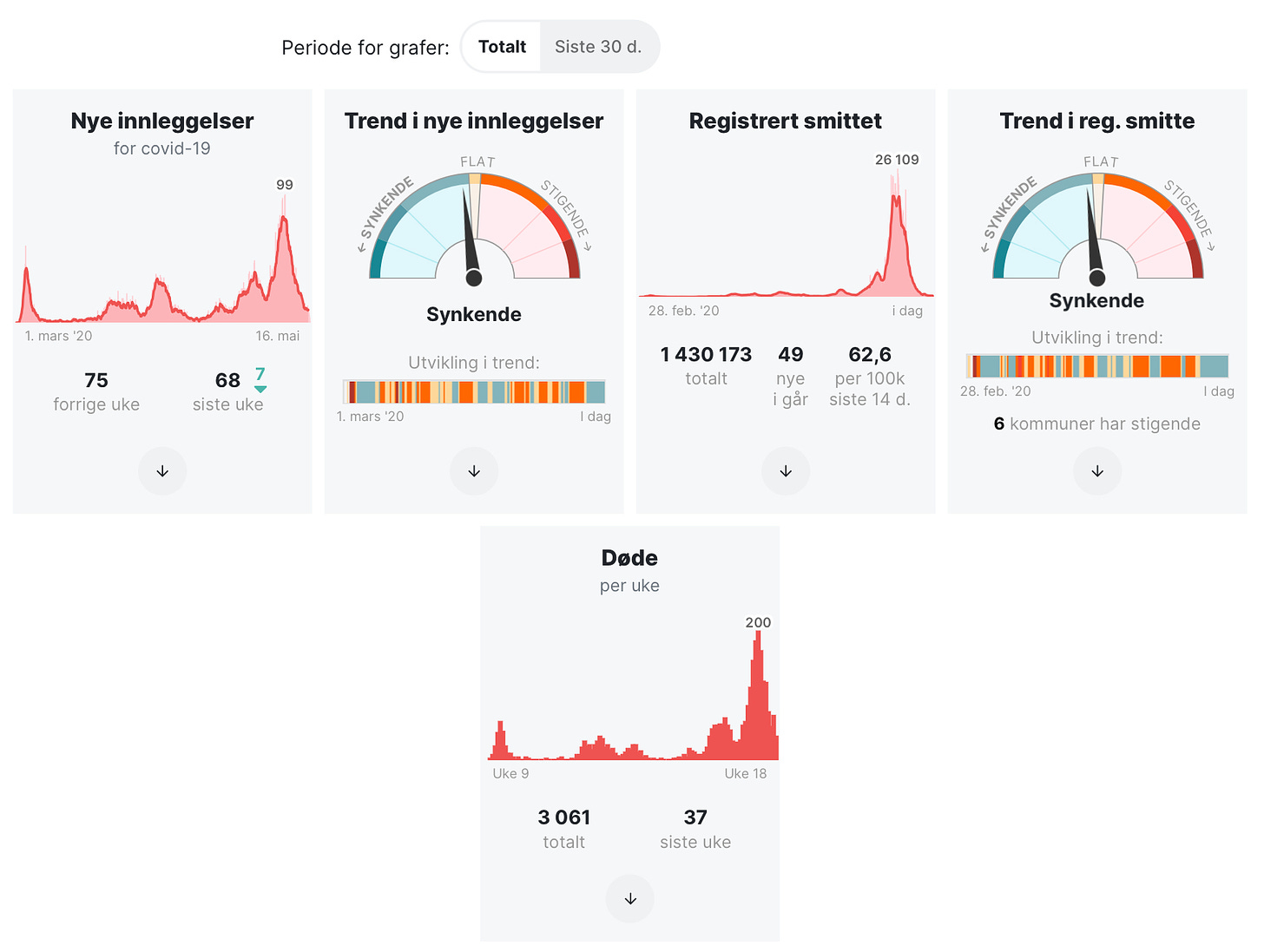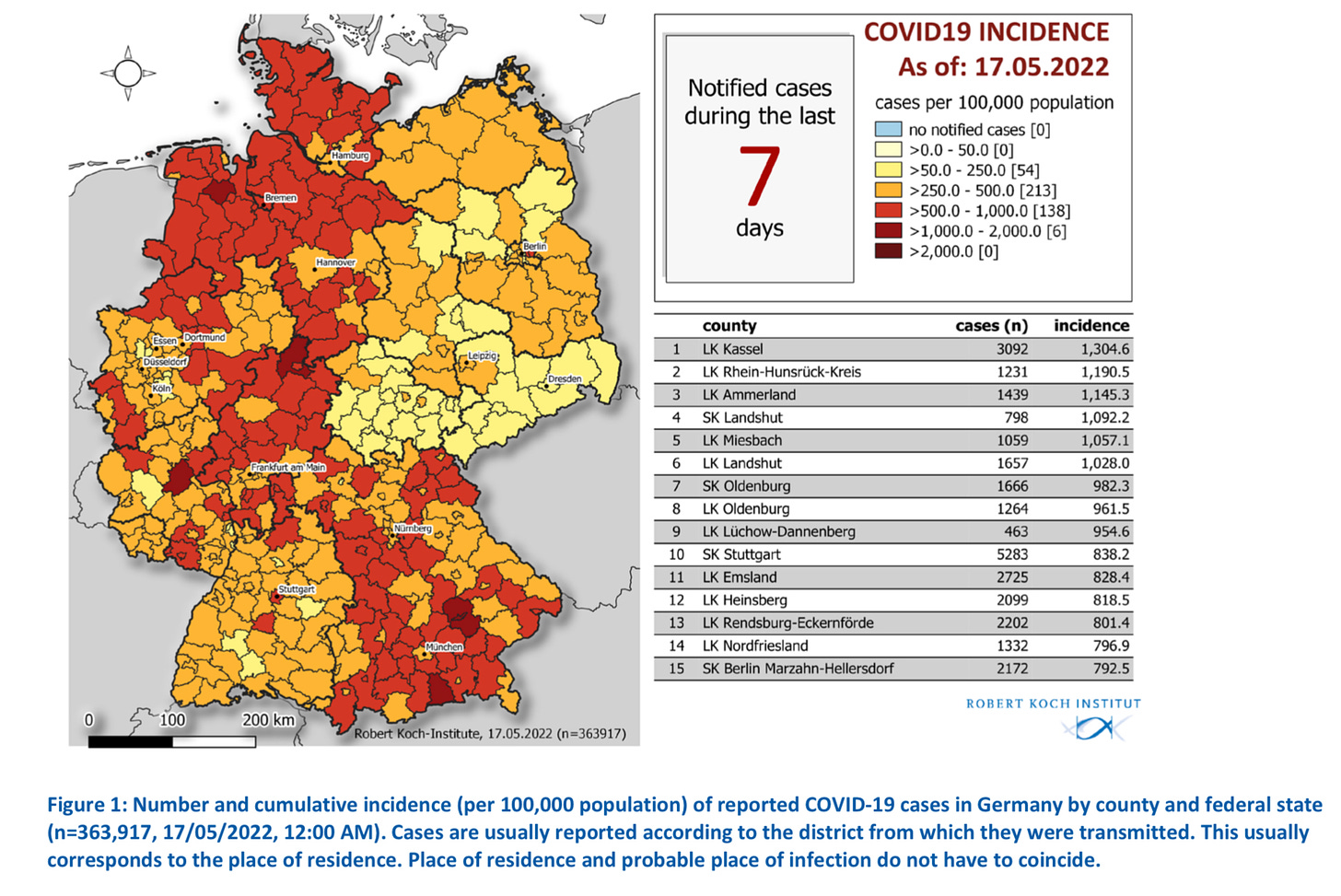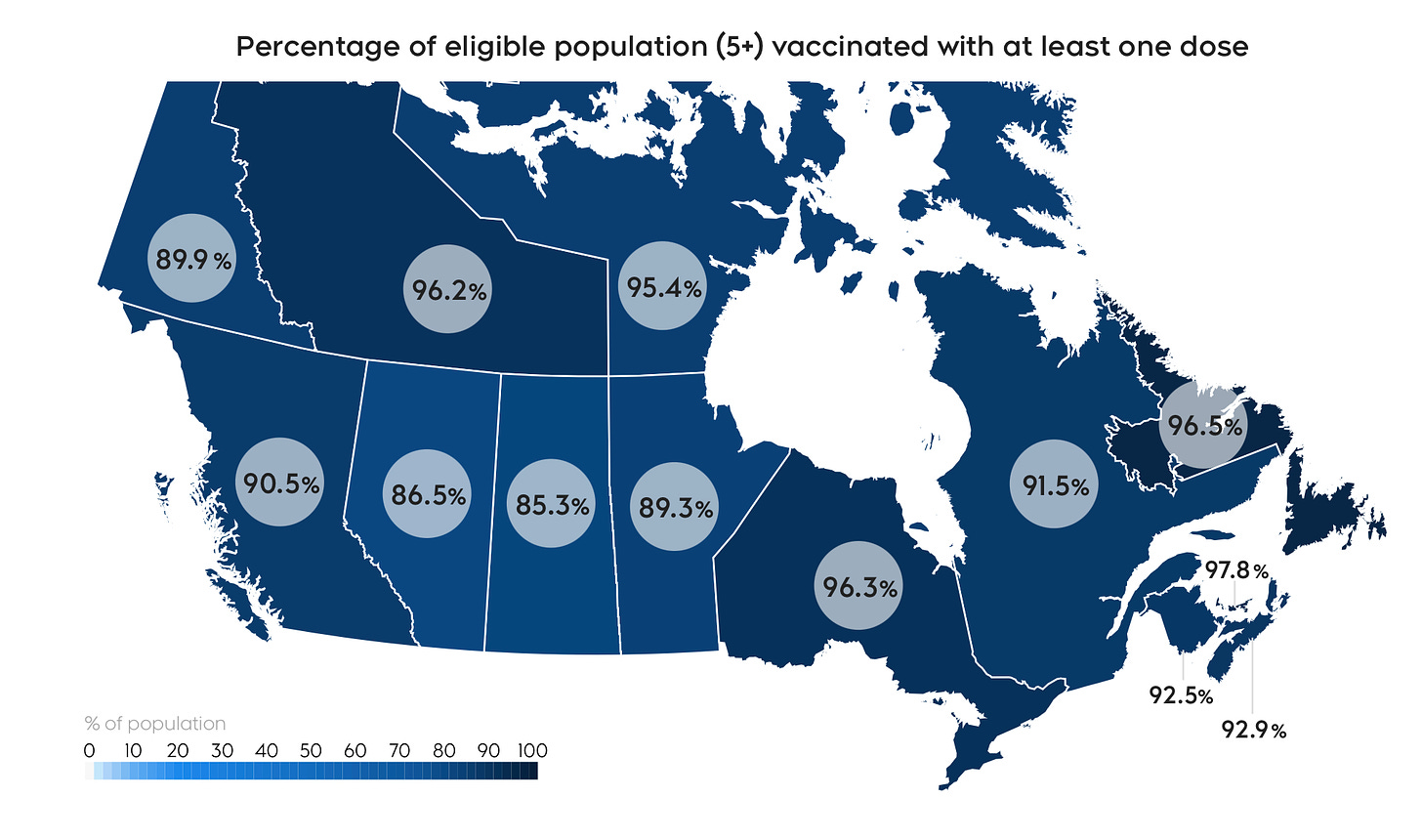The Evening Report - May 17
Finland and Sweden sign off on NATO applications. Hospitalizations in Denmark fall
🇺🇦/ 🇷🇺 War
The International Criminal Court sent a 42 member delegation to Ukraine this week to investigate possible war crimes and crimes against humanity committed by invading Russian forces. This is the largest delegation the body has ever dispatched since it began operations in 2002. Ukraine and a number of other countries have accused Russia of a growing swath of war crimes. Despite a mountain of evidence to the contrary, Russia has denied any wrongdoing.
🇫🇮 🇸🇪 NATO
Finland and Sweden will both submit applications to join NATO simultaneously on Wednesday (today).
On Tuesday, the Finnish parliament voted overwhelmingly to approve joining the North Atlantic Treaty Organization with a decisive vote of 188 to 8. This was followed by Finnish Defense Minister Pekka Haavisto officially signing Finland’s NATO application.
“Democracy has spoken. The result of the parliamentary vote 188-8. Signature of NATO membership application. A new chapter in Finnish history.”
Finnish Prime Minister Sanna Marin:
“Strong support from Parliament for the state leadership to promote Finland's NATO membership. 188 MPs were in favor. The long and stable line of foreign and security policy, which seeks consensus, is still in place today.”
In Sweden, Foreign Affairs Minister Ann Linde also signed Sweden’s NATO application to make it official. This comes a day after broad parliamentary support was also on display in a historic end to Sweden’s policy of neutrality that dates back to the Napoleonic wars in the early 1800s.
🇷🇺/ 🇫🇮
Russia has expelled two Finnish diplomats. The move comes about a month after Finland booted out two Russian diplomats. It also comes the same day that Finland announced it would seek membership in NATO and signed off on the application to do so.
🇩🇰/ 🇸🇪 🇫🇮
Danish Prime Minister Mette Frederiksen says Denmark will stand beside Sweden and Finland during the NATO application process, even if that means a military response. Denmark like the UK, Norway, Iceland, and now France, have all provided the two Nordic nations “security insurance” during the application process when NATO’s Article 5 doesn’t apply. Frederiksen says that Denmark will do “everything we can to help the two countries” should Russia attack.
“When Putin tries to divide us, we must unite. The West has never stood so united. And now the Nordic region is moving even closer together. After more than 70 years outside NATO, both Finland and Sweden now want to join. Denmark wholeheartedly supports this. We are neighbours. We are friends. I look forward to becoming NATO allies now as well. It will strengthen the security of Denmark, Finland, and Sweden. It will make NATO even stronger. And it will provide new opportunities for strengthened Nordic co-operation in security and defense policy. It's needed right now. And we will therefore also do what we can to ensure that Finland and Sweden join NATO as soon as possible.”
🇩🇰/ 🇪🇺🇺🇦
It looks like Denmark may be on the outside looking in, at least for now, as the European Union works on additional help for Ukraine, including a possible training program for Ukrainian soldiers. Danish Minister of Defense Morten Bødskov says that Denmark’s opting out of EU defense policy prohibits it from playing a comprehensive role in the EU effort.
“The war is now in a new phase and the expectation is that there are EU member states that will help with training Ukrainian soldiers. And if such a training activity is organized in the EU, then the consequences are that Denmark cannot participate.”
The defense minister also had to sit out of the first part of the EU security meeting as European countries discussed the European Defense Agency. Denmark was barred from participating because of its long-standing opt-out on EU defense.
When Denmark joined the European Union it retained its independence on a number of fronts including opting out of the euro in favour of the Danish kroner, and it also opted-out on several other fronts including security and defense.
On June 1, a national referendum will be held to determine if Denmark should abandon its opting out on EU security and defense and instead integrate with the EU on that front.
🇩🇰/ 🇷🇺 🇺🇦
Once the war in Ukraine is over Russia will be getting the bill for what will be extremely expensive reconstruction work. At least that is the opinion of Denmark’s Foreign Affairs Minister, and he isn’t alone. Coming out of a meeting of EU foreign affairs ministers, Jeppe Kofod said Russia must pay a huge financial price for its invasion and the widespread destruction it caused.
“Exactly how we do it, we still have to discuss. But the Danish position is clear: This comes with the maximum costs for Russia. Especially in relation to the reconstruction costs.”
A number of EU countries are also in agreement as the European Union pledges billions of euros to help Ukraine rebuild, a bill countries are eager to avoid passing on to their taxpayers. Ukraine, the United States, and others have raised the idea of confiscating all Russian owned property, goods, and other belongings to help foot the reconstruction bill.
🇩🇰/ 🇺🇦
The Danish government has reached an agreement with the General Practitioners' Organization so that Ukrainian refugees arriving in Denmark will have a family doctor.
Practitioners Chair Jørgen Skadborg spoke to DR:
“We have reached an agreement to get ready to receive the Ukrainian refugees who get a residence permit after their arrival and then distribute them so that they get a doctor and individual doctors do not have to accept relatively many refugees.”
The two year deal specifies that Denmark’s 3,500 family doctors will each have to take in 20 Ukrainian refugees. That number could also be increased if need be.
🇪🇺🇩🇰🇩🇪🇧🇪🇳🇱
The EU wind energy summit begins this morning in Esbjerg, Denmark. Europe is trying to reach its goal of becoming carbon neutral by 2050. It is also trying to divorce itself as quickly as possible from relying on Russian oil and gas in response to the invasion of Ukraine. Top politicians from the EU Commission will meet with officials and heads of state from Denmark, Germany, the Netherlands, and Belgium who have joined forces to drastically increase wind energy production in the North Sea. They want to build out 150 gigawatts of offshore wind energy by 2050. That is a ten-fold increase from what is being produced today. It is also only about half of what the EU estimates will be needed to reach its climate goals.
🦠Pandemic🦠
🇩🇰
Denmark’s Health Minister Magnus Heunicke says the COVID contact number (reinfection rate or R0) remains at 0.8 for a 2nd straight week.
He says coronavirus wastewater testing shows declining virus activity in three of the five Danish regions. Heunicke says there were “small increases” in Region Hovedstaden (Metro Copenhagen) and Region Syddanmark.
-
COVID hospitalizations (425) continue to drop (-23) while the number of severe infections in an ICU (13) is unchanged, and of those the number on a ventilator (3) inched down (-1). Infection admissions to a psychiatric ward (116) fell (-13).
Infected seniors 65 years old and older continue to see the highest number of hospitalizations over the last seven days.
Health Minister Magnus Heunicke says that COVID hospitalizations are headed in the right direction, with fewer than 40 admissions in each of the last four days. Overall, he says, hospital admissions in the past week haven’t been this low since December.
-
Denmark reported 803 COVID infections (underreported), including 68 reinfections, and another three coronavirus deaths in the last day.
There were just 8,440 PCR tests taken on Monday, equaling a positivity percentage of 9.51%.
-
On the vaccination front, things remain more or less at a standstill. To date, 82% of the total population have one vaccine dose, 80.6% have two, and 61.6% have had a booster dose.
-
Denmark’s COVID vaccination program has been thoroughly reviewed by two outside agencies who determined the program was very successful. But the reviews also found that some improvements could be made.
The Danish National Board of Health says a report submitted by Oxford Research focused on the vaccination programs roll-out and execution as a whole. While, a company called Rambøll analyzed outreach efforts targeted at different specific groups throughout the vaccination campaign.
Deputy Director Helene Probst:
“Overall, it was a huge success. We are very satisfied and proud of the broad cooperation. It was a new way of working together and it was a really great team effort. Neither we nor others on their own could have succeeded in vaccinating so many in such a short time. It is also important to look at what did not work so well and where there is room for improvement; we must also learn from that.”
The report found that the high level of organization behind the campaign was a major factor in pulling it off so successfully. In particular, it noted, the flexibility within the program was invaluable to both ratchet up and relax vaccination efforts as need be.
The review found the online booking system to schedule vaccination appointments both worked really well but also presented some unanticipated problems.
“Even though it has gone really well overall, there have been bumps in the road. The booking system presented a number of challenges with waiting times for the citizens, and the target group order created a great deal of uncertainty. The order was made based on who had a higher risk of serious infection. But especially the target group of people at particular risk created some confusion, and it turned out to be really difficult to pinpoint exactly who belonged to each group, and then communicate that.”
In an effort to combat social inequality challenges in the vaccination drive, Denmark launched a number of outreach campaigns targeted at different groups. Here the second review found plenty of room for improvement.
“It quickly became clear that there was less support for vaccination in some areas of the country and that our information and efforts did not reach everyone. It was a task for which we needed help.”
While the health board enlisted volunteer groups, aid organizations, and even high profile members of different cultural groups vaccination rates did not reach the heights seen in the rest of the population. The second report made a number of suggestions on how to make improvements.
“We must learn from these experiences for the future, both in relation to vaccination, but also in other areas of prevention, where the target groups are particularly vulnerable populations. Experience has shown us that when we want equality in healthcare, it requires a great deal of effort, where the health services are easily accessible, and where local actors are involved to reach out to everyone.”
-
The COVID lockdown didn’t work out so well for Fitness World in Denmark. According to Ritzau, the lockdown cost the fitness company 221 million Danish kroner (about $40 million Cdn) last year. This follows a 330 million kroner (about $60 million Cdn) loss in 2020 as it had to keep its door closed as part of strict COVID restrictions.
🇸🇪
Sweden only updates its COVID statistics once a week, every Thursday.
-
COVID hospitalizations continue to slide in Sweden’s capital region. Region Stockholm says it has 117 pandemic patients in area hospitals. That is 15 fewer than the week prior.
But Chief Physician Johan Bratt says the overall situation remains concerning.
“There is still a stable spread of infection in the county and we do not see any clear signs this week that the infection is either increasing nor decreasing. We continue to follow the development closely.”
The region says roughly half of the infected people in hospital are there specifically because of a severe coronavirus infection. The other half have an infection but have been admitted to hospital for another reason. In either case, it notes that patients who have COVID must be treated with all infection protocols in place, adding an extra strain to the system.
The region notes that people who are either not vaccinated at all or are partially vaccinated “are greatly overrepresented” among those who are hospitalized due to an infection.
In the last week, 454 new infection cases have been confirmed (underreported) with 17 of those infections being identified in senior care homes.
There have been six more pandemic deaths in Region Stockholm in the last week. The region continues to note that Sweden is still struggling with a backlog in reporting COVID deaths as they have for many months now.
🇳🇴
Norway has recorded 353 new infections (underreported) and had no new reported pandemic deaths in the last 24 hours.
The Norwegian Institute of Public Health no longer reports daily COVID hospitalizations. But over the last seven days, there have been 68 admissions, which is seven fewer than the week before.
To date, 80.4% of Norwegians 12 years old and older have one vaccine dose, 74.9% have two, and 54.5% have a booster dose.
🇫🇮
Finland only updates its COVID numbers once a week on Thursdays.
-
After taking two years to reach 3,000 COVID deaths, Finland now has 4,284 fatalities recording over 1,200 pandemic deaths in just over a month since reaching 3,000 lives lost. The rapid increase in coronavirus fatalities is getting noticed in one of the countries that had, until now, been considered a pandemic success story.
Director of Diagnostics at the Helsinki and Uusimaa Hospital District Lasse Lehtonen spoke to Yle to say there are several reasons for rising COVID deaths. Among them, he says, are waning interest in getting vaccinated, especially for a third dose, much more contagious variants; a lack of specific measures to protect vulnerable populations; and the public tuning out the pandemic to shift their attention to other things like the situation with Russia.
“Unfortunately, it must be recognized that the coronavirus pandemic is not over. And we need to cope with this while also dealing with all these other crises.”
🇩🇪
Germany recorded 86,252 new COVID infections and lost another 215 lives to the coronavirus since its last update on Monday.
It added 1,202 hospitalizations, while ICU numbers (943) edged upward (+20). As a percentage of all intensive care beds in the country, COVID patients are using 4.3%.
So far, 77.6% of the total population have one dose, 75.8% have two, and 59.5% have a booster shot.
-
A health ministers conference in Germany concluded that preparations need to begin now to put tools in place to deal with a possible fall COVID wave. The health ministers of Germany’s 16 states have said that the tools they have aren’t going to cut it if the pandemic comes roaring back when the seasonal effect begins to work against us again.
German Health Minister Professor Karl Lauterbach supports the decision saying the current laws to combat the epidemic are “too thin.” He says “I know nobody wants to hear that in the summer” but it is crucial that preparations begin now to brace for whatever the coronavirus throws at the country this fall and winter.
🇨🇦
Canada reported 1,559 new COVID infections (wildly underreported) and seven more pandemic deaths on Tuesday.
The national positivity percentage over the last seven days is 11.5%.
The Canadian vaccination effort has so far administered 33,171,706 1st vaccine doses (86.75% of the total population) while 31,326,771 people (81.93%) have a second dose, and of those, 19,780,938 people are fully vaccinated with three doses.




